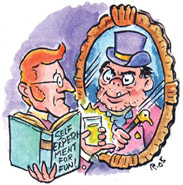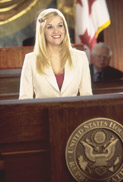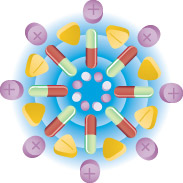Around campus
No, you go first...
Journalism and medicine are professions that have much in common. Doctors are well-paid, respected, trusted members of society. For their part, journalists are, well, also members of society (strictly speaking).

Jack Ruttan
The two professions are combined in the person of Dr. Lawrence Altman, an award-winning reporter with the New York Times who received his medical degree from Tufts in 1962.
Altman will be at McGill to deliver two talks. The first, part of the Redpath Museum's Cutting Edge Lectures in Science, is called "Medicine and the Press: Then and Now." His second lecture, entitled "Who Goes First: The Story of Self-Experimentation in Medicine," will be based on his 1998 book on so-called auto-experimentation. Imagine, for instance, injecting yourself with tumour cells, as Nobel laureate Gerhard Domack did to prove that cancer was not an infectious disease. Or heed the words of German apothecary Friedrich Serturner, the first to isolate morphine from poppy sap, testing the resulting substance on himself: "I consider it my duty to attract attention to the terrible effects of this new substance in order that calamity may be averted."
"Medicine and the Press: Then and Now," Thursday, April 14, 6 pm. Redpath Museum Auditorium. "Who Goes First: The Story of Self-Experimentation in Medicine," April 15, 11 am, McIntyre Medical Building, Rm 1034.
Lights, camera, legal action!
Not every law round table has a web page that starts with a quote from Nietzsche's Will to Power next to a photo of a young man playing in a sculpture garden in Lachine. This is no ordinary gabfest on matters legal: this is the rather grandly titled International Roundtable for the Semiotics of Law.

Reese Witherspoon in the movie Legally Blonde
Semiotics are, of course, the study of signs and sign systems. In the roundtable -- convened by professor Desmond Manderson and featuring participants from as far afield as Brazil -- they intersect with law in the field of physical space. We therefore have McGill professor Rod MacDonald discussing office politics and William MacNeil of Griffith University in Australia, whose conference abstract promises a review of law in modern cinema: "Legally Blonde refuses any easy answers to this question, but may point, in its very pointed comedy, to a feminist diagnosis of the psychopathology of not only law school and legal education, but also legal knowledge itself -- as a training for hysteria rather than hierarchy."
International Roundtable on the Semiotics of Law, "Legal Spaces" Annual Meeting, April 15 to 16, 2005, Thomson House, 3650 McTavish St. For more information, visit www.mcgill.ca/irtsl.
Doctors on drugs
The relationship between a doctor and their patient was simpler, back in the day. If the patient was sick, the doctor would make an examination, mutter a diagnosis of "Nescio quid dicas," or possibly "Fac ut gaudeum," and charge a hefty fee.

Tzigane
Modern communication and the passing of Latin has changed all that. Now, patients are just as likely to march into a doctor's office having already diagnosed themselves, and, thanks to direct-to-consumer advertising, only needing an MD's stamp of approval for the prescription they're sure they need.
Martin Dawes, chair of McGill's Department of Family Medicine, will be giving the Dr. Hirsh Rosenfeld Annual Lecture on "Being an Informed Consumer of Medication: How Your Family Physician Can Help." Too often, the result of patients getting more information about drugs and treatments is a strained relation with their physician. When a patient approaches their doctor asking for a specific prescription and are turned down, both parties are left feeling alienated, to the point that 15 percent of patients considered switching doctors after such encounters.
"Both patients and health care professionals feel angry -- it is like having this third person in the room irritating the two parties," said Dawes.
The solution Dawes proposes is not a return to blind trust, but rather that patients become even better informed. Pharmaceutical companies need to start making more data easily accessible and understandable to patients, so they know before going to their physician that medicine X is inappropriate for ailment Y.
"You wouldn't buy a car without knowing the cost, the safety record and fuel consumption, yet you'll take a treatment without knowing any of those things, and possibly take it for the rest of your life."
Wednesday, April 20 at 7 pm, Jonathan C. Meakins Auditorium McIntyre Medical Building 5th Floor, 3655 Promenade Sir William Osler. For more information, call 398-7375 ext. 0466
An unlikely friendship
In July 1971, as the Southern city of Durham, North Carolina, struggled to cope with the racial upheaval of desegregation, community leaders gathered to discuss civic and school conditions. The 10-day meeting was co-chaired by Ann Atwater, an activist representing the Black community, and C.P. Ellis, who was one of the 10 Exalted Grand Cyclops of the Ku Klux Klan (KKK).
By the end of the congress, Ellis had publicly burned his KKK membership, and he and Atwater -- who had disliked him on sight -- had forged the beginnings of a relationship that was chronicled in the 2002 documentary An Unlikely Friendship.
It's an inspiring story for anyone interested in opening lines of communication with people previously seen as the enemy, something that the McGill Middle East Program in Civil Society and Peace Building knows a lot about. On April 20, the program is hosting a screening of the documentary, along with a round-table discussion featuring director Diane Bloom, Egbert Gaye (the editor of Community Contact), Jean Panet-Raymond (community organizer, FRAPRU) and Michael Doxtater (director of the Office of First Nations and Inuit Education, McGill).
An Unlikely Friendship, Wednesday, April 20, 5:30 pm, Leacock 232. For more information, contact Lisa Van Dusen at 398-6389.
